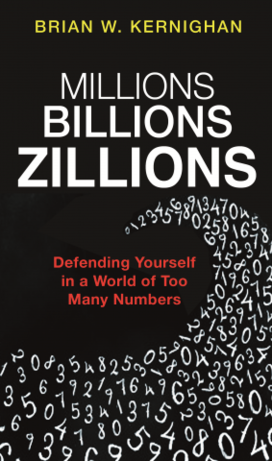Brian Kernighan *69 Offers Protection Against Numbers

This is not rocket science or even “mathematics.” Kernighan walks readers through concepts like bias in statistics, graphical trickery, and estimation over the course of 150 pages. Drawing on examples from journalism, advertising, and politics, he gives shortcuts and tips for assessing the credibility of numbers and identifying common mistakes, allowing readers to walk away better prepared to face the reality of the number-driven world that exists today.
The author: Brian Kernighan *69 is a professor of computer science at Princeton University. He is the author of a dozen books, including The Elements of Programming Style; Hello World: Opinion Columns from the Daily Princetonian; and Understanding the Digital World.
Opening lines:
“How many @#$%^&* cars are there?”
(the author, stuck in yet another endless traffic jam)
I’ve asked myself this question any number of times when I’m in a traffic jam with no end in sight, just immobile cars as far as the eye can see. This has happened to me in the United States, Canada, England and France over the past few years; you’ve undoubtedly had similar experiences somewhere.
So how many cars are there? You might wonder about the number on the road ahead, or in the town you live in, or the total in your home country.
Stop right now! Don’t reach for your computer or your phone; don’t ask Siri or Alexa. Imagine that you’re in a situation where you simply can’t ask. Perhaps your traffic jam is out in the countryside where there is no cell service, or you’re on a plane without Internet connectivity, or maybe you’re in an interview where a prospective employer wants to see whether you can think for yourself.
Your job is to figure out sensible answers on your own, without consulting any other sources—in other words, to come up with an estimate. Dictionary.com defines the noun estimate as “an approximate judgment or calculation, as of the value, amount, time, size, or weight of something,” and the verb as “to form an approximate judgment or opinion regarding the worth, amount, size, weight, etc., of.” That’s exactly what you should do first.
Reviews: “This sophisticated, rich, and accessible book walks us through something we all need but are almost never taught: number sense…Brian Kernighan has done a great service by offering tools that will help all of us become more informed citizens, patients, parents, and news consumers—and better bullshit detectors.”—Zeynep Tufekci, contributing opinion writer for the New York Times and author of Twitter and Tear Gas: The Power and Fragility of Networked Protest












No responses yet